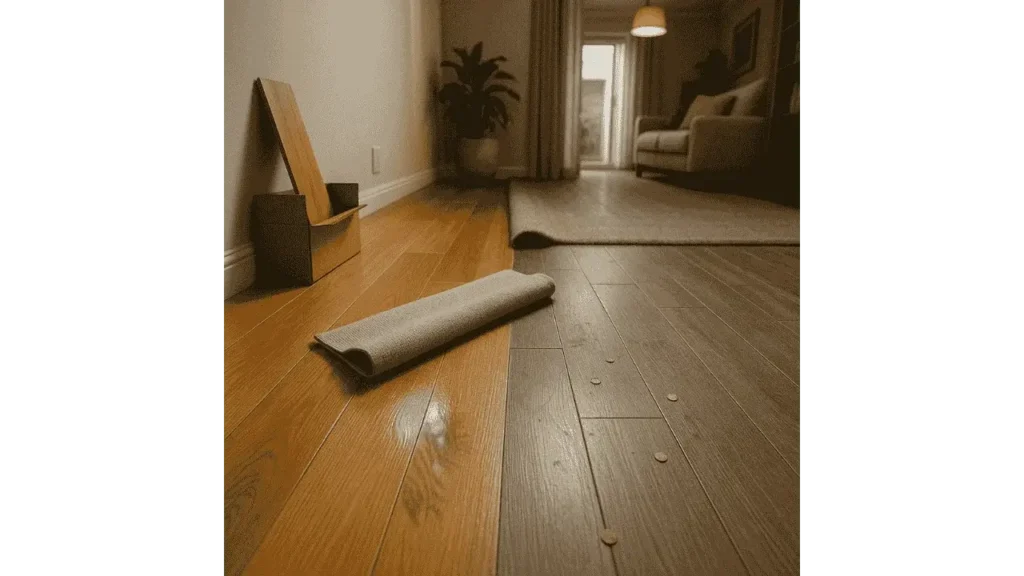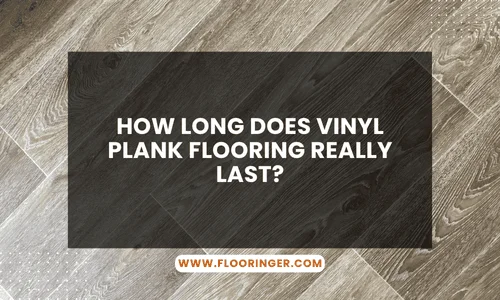Vinyl plank flooring has earned a solid reputation among homeowners for its balance of style, affordability, and durability. But how long does it really last? Based on quality and care, vinyl plank flooring typically endures between 10 to 25 years. I’ve seen clients enjoy decades of wear from premium vinyl, while low-end versions sometimes need replacing within a decade. It all comes down to the quality of the product, how it’s installed, and how well it’s maintained.

What is Vinyl Plank Flooring?
Composition and Structure
Vinyl plank flooring is designed to resemble natural wood or stone while offering easier upkeep. It consists of layered construction: a clear wear layer on top, a printed design layer, and a rigid or flexible core underneath. These layers combine to create a tough, water-resistant surface that handles everyday wear and tear.
Installation Methods
One of the appeals of vinyl plank flooring is its simple installation. Click-lock planks are popular for DIY projects, while glue-down and loose-lay options are often used in professional settings. Each method impacts longevity; click-lock planks may shift over time without proper subfloor prep, while glue-down versions provide a firmer, longer-lasting hold.
Maintenance and Longevity
Cleaning Practices
A major factor in how long your vinyl flooring lasts is regular cleaning. Dirt and debris can scratch the wear layer if left unchecked. I always suggest sweeping daily and mopping with a damp (not soaking wet) microfiber mop weekly. Avoid harsh cleaners; they can strip protective coatings.
Protective Measures
Using felt pads under furniture legs, cleaning up spills quickly, and adding area rugs in high-traffic zones go a long way in preserving your floor. Homeowners who follow these steps see far fewer scratches and dents over time. It’s also smart to keep blinds drawn during peak sunlight hours to prevent fading.
Read More: How to Glue Down Your Vinyl Plank Flooring?
Lifespan Expectancy
When properly maintained, high-quality vinyl plank flooring can last 20 to 25 years. Lower-end options may show wear within 5 to 10 years, especially in busy areas. According to interior designer Melissa Ward,
“Investing in luxury vinyl with a thicker wear layer pays off. It may cost more upfront, but it holds up beautifully in high-traffic homes.”
Pros and Cons of Vinyl Flooring Options
Advantages
Vinyl plank flooring is water-resistant, low-maintenance, and comfortable underfoot. Its variety of patterns and textures lets homeowners achieve high-end looks without the price of hardwood or stone. It’s also relatively quiet and doesn’t require special cleaners.
Disadvantages
That said, it’s not indestructible. Heavy furniture or pet claws can still leave marks. Prolonged exposure to direct sunlight can lead to discoloration. And although it resists moisture, standing water can seep into seams if not wiped up quickly.
Choose Luxury Vinyl for Long-Lasting Flooring
Why Choose Luxury Vinyl?
Luxury Vinyl Plank (LVP) typically includes a thicker wear layer, making it more durable and scuff-resistant than standard vinyl. It’s a popular upgrade for families or pet owners who need added resilience. Some LVP lines also include soundproofing or cushioning features.
Just In: Can you lay Vinyl Planks Over Tile Floors?
Additional Benefits
High-end LVP looks nearly identical to real wood and often comes with extended warranties. Flooring expert James Nolan notes,
“Luxury vinyl is bridging the gap between function and fashion. It holds up to kids, pets, and parties; and still looks premium.”
Making an Informed Choice
When shopping, look at the wear layer thickness, warranty coverage, and whether the core is rigid or flexible. Opt for a brand with good reviews and dealer support. Remember, better products last longer and save money in the long run.
Conclusion
Vinyl plank flooring is a smart investment for style and durability, especially when chosen and maintained wisely. While its lifespan varies based on quality and care, it’s entirely possible for well-kept vinyl to last two decades or more. Choosing higher-end products, keeping up with cleaning, and protecting your floors from daily wear all contribute to a longer, more attractive life span for your vinyl flooring.
